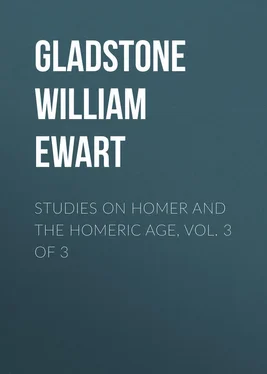Ibid. 225.
Ibid. 231.
Ibid. 239.
Il. ii. 213.
φολκός. See Buttmann, Liddell and Scott. Commonly rendered ‘squinting.’
Il. ii. 214-19.
Ibid. 275, 220.
Il. ix. 198.
In 237 he appears to follow what Achilles had said i. 170.
Il. ii. 241, 2.
Il. ii. 229-31.
xxi. 40, 79. xxii. 44.
246-56.
Grote’s Hist. Greece, vol. ii. 95, 6.
Ibid. pp. 96, 98.
Il. ii. 198.
Ibid. 190, 200.
vv. 271-8.
Il. ii. 270.
Il. xviii. 502.
Il. vii. 381.
Sup. p. 100.
Od. iii. 139.
Od. ii. 212.
Od. ii. 239-41.
Griech. Staatsv. b. ii. p. 57.
Od. ii. 257. Il. i. 305.
Od. vii. 151.
Od. vii. 189-94, 317.
Od. viii. 7-15.
The number deserves remark. Fifty, as we know from the Catalogue, was a regular ship’s crew of rowers. What were the two? Probably a commander, and a steersman. The dual is used in both the places where the numbers are mentioned (κρινάσθων, ver. 36, κρινθέντε, 48, βήτην, 49). There are other passages where the dual extends beyond the number two, to three and four. See Nitzsch, in loc. But the use of it here with so large a number is remarkable, and may be best explained by supposing that it refers to the δύω, who were the principal men of the crew, and that the fifty are not regarded as forming part of the subject of the verb. If this be so, the passage shows us in a very simple form the rudimentary nautical order of the Greek ships.
Od. viii. 38.
Od. viii. 158-64.
Od. viii. 157.
Probably the strictly proper name of the Assembly, as distinguished from the place of meeting, is ἄγυρις or πανήγυρις (as Od. iii. 131), but the name common to the two prevails.
Od. xxiv. 463.
Od. xxiv. 546.
Besides all the particulars which have been cited, we have incidental notices scattered about the poems, which tend exactly in the same direction. For example, when Chryses prays for the restitution of his daughter, his petition is addressed principally to the two Atridæ, but it is likewise addressed to the whole body of Ἀχαιοὶ (Il. i. 15), that is, either to the entire army, or at any rate to all the kings; or, to all the members of the Achæan race. This we may compare with the application of the prayer of Ulysses in Scheria to the king and people.
Il. viii. 28, 9. ix. 430, 1.
Il. viii. 38-40.
Il. i. 5.
Il. iv. 17-19.
Od. ii. 68, 9.
Il. xviii. 497.
Il. xi. 807.
Od. ix. 112-15.
Tittmann Griech. Staatsv. b. ii. p. 56.
Il. ix. 404.
Achæis, or Ethnology, sect. ix. p. 496.
Il. viii. 47, 8.
Il. iii. 298.
Il. iv. 48.
Il. xxi. 442 seqq. vii. 459. xii. 17.
Olympus, sect. iii. p. 197.
Il. vi. 298-300. 305-10.
Il. v. 446.
Il i. 37-9.
Il. vii. 540. xiii. 827.
Il. i. 457.
Il. v. 49.
Il. v. 421-5. 348-51. iii. 405-9.
Il. v. 9. and 20-4.
Il. xiv. 490.
Il. iii. 103. 116.
Il. xviii. 239.
Il. xxiv. 234-5.
Il. vi. 289-92.
Herod. ii. 50.
Döllinger Heid. u. Jud. VI. iii. p. 411.
Rhea (ἔρα) shows us the fourth and cosmogonic side of the same conception.
Olympus, sect. iii. p. 234.
Il. xiv. 490.
Il. xxiv. 194.
Olympus, sect. v.
Il. xxiv. 347, 355, 358-60.
Il. v. 77.
Il. ix. 575.
Od. xv. 223 and seqq.
Il. xxi. 331 and seqq.
Il. xx. 7.
Il. xxi. 130-2.
Il. iv. 474, 488.
Il. v. 49.
Od. v. 445.
Il. xxiii. 144.
Il. xi. 728.
Il. xx. 221.
Il. iii. 147-9. xv. 525-7.
Il. xiv. 271. xv. 37.
Il. 2. 751-5.
Compare Il. iii. 276. xix. 258.
Il. xx. 74.
Il. xxi. 308.
Od. xiii. 356.
Od. xiii. 103.
Ibid. 96.
Od. xvii. 208-11.
Il. vi. 21.
Il. xiv. 444.
Il. xx. 384.
Il. xxii. 435. xxiv. 209.
Il. ix. 559.
Il. xix. 90-133.
Il. xxiv. 602-17.
Od. xx. 66.
Od. xxi. 295-304.
Il. v. 697, and vii. 60.
Il. xxiv. 220.
Читать дальше












